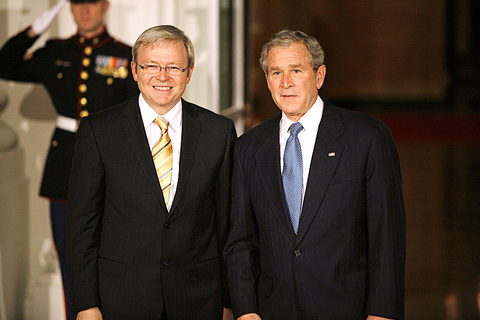World leaders prepared to adopt an early warning system for financial calamities, a commitment to tougher accounting rules and other modest steps to try to prevent crises like the one now threatening the livelihoods of billions of people around the globe.
Nearly two dozen leaders dined in extravagance at the White House on Friday in a prelude to negotiations yesterday over how best to wrestle global economies back from the brink of economic disaster.
The leaders were on track to approve measures to make the world financial system more accountable to investors and more transparent to regulators, said diplomatic sources, speaking on condition of anonymity. To do so, the leaders were expected to endorse more effective accounting rules governing how companies value their assets, a weakness seen as partly responsible for the current financial crisis.

PHOTO: BLOOMBERG
A new early warning system would look for signs of burgeoning problems like those in the US housing market and related overuse of mortgage-backed securities. On Friday, the heads of the IMF, the world’s financial firefighter, and the Financial Stability Forum, a group that includes central banks and major financial regulators, said they would cooperate on “early warning exercises” to detect vulnerabilities.
Bush gave Australian Prime Minister Kevin Rudd a less than warm welcome at the White House dinner amid controversy over a leaked conversation between them, a report said yesterday.
Bush “appeared somewhat standoffish” as he greeted Rudd, the Australian Associated Press reported from Washington.
At the heart of the controversy is a claim in an Australian newspaper last month that Bush displayed embarrassing ignorance by asking Rudd in a telephone call about the crisis: “What’s the G20?”
The allegation has been denied by both Canberra and Washington.
“While other world leaders got big smiles and pats on the back from Mr. Bush, the Australian prime minister had to make do with a brief handshake and a relatively stony face from the president as the pair posed for photographers and TV crews,” the report said.

Taiwan is gearing up to celebrate the New Year at events across the country, headlined by the annual countdown and Taipei 101 fireworks display at midnight. Many of the events are to be livesteamed online. See below for lineups and links: Taipei Taipei’s New Year’s Party 2026 is to begin at 7pm and run until 1am, with the theme “Sailing to the Future.” South Korean girl group KARA is headlining the concert at Taipei City Hall Plaza, with additional performances by Amber An (安心亞), Nick Chou (周湯豪), hip-hop trio Nine One One (玖壹壹), Bii (畢書盡), girl group Genblue (幻藍小熊) and more. The festivities are to

Auckland rang in 2026 with a downtown fireworks display launched from New Zealand’s tallest structure, Sky Tower, making it the first major city to greet the new year at a celebration dampened by rain, while crowds in Taipei braved the elements to watch Taipei 101’s display. South Pacific countries are the first to bid farewell to 2025. Clocks struck midnight in Auckland, with a population of 1.7 million, 18 hours before the famous ball was to drop in New York’s Times Square. The five-minute display involved 3,500 fireworks launched from the 240m Sky Tower. Smaller community events were canceled across New Zealand’s

‘SLICING METHOD’: In the event of a blockade, the China Coast Guard would intercept Taiwanese ships while its navy would seek to deter foreign intervention China’s military drills around Taiwan this week signaled potential strategies to cut the nation off from energy supplies and foreign military assistance, a US think tank report said. The Chinese People’s Liberation Army (PLA) conducted what it called “Justice Mission 2025” exercises from Monday to Tuesday in five maritime zones and airspace around Taiwan, calling them a warning to “Taiwanese independence” forces. In a report released on Wednesday, the Institute for the Study of War said the exercises effectively simulated blocking shipping routes to major port cities, including Kaohsiung, Keelung and Hualien. Taiwan would be highly vulnerable under such a blockade, because it

UNDER WAY: The contract for advanced sensor systems would be fulfilled in Florida, and is expected to be completed by June 2031, the Pentagon said Lockheed Martin has been given a contract involving foreign military sales to Taiwan to meet what Washington calls “an urgent operational need” of Taiwan’s air force, the Pentagon said on Wednesday. The contract has a ceiling value of US$328.5 million, with US$157.3 million in foreign military sales funds obligated at the time of award, the Pentagon said in a statement. “This contract provides for the procurement and delivery of 55 Infrared Search and Track Legion Enhanced Sensor Pods, processors, pod containers and processor containers required to meet the urgent operational need of the Taiwan air force,” it said. The contract’s work would be